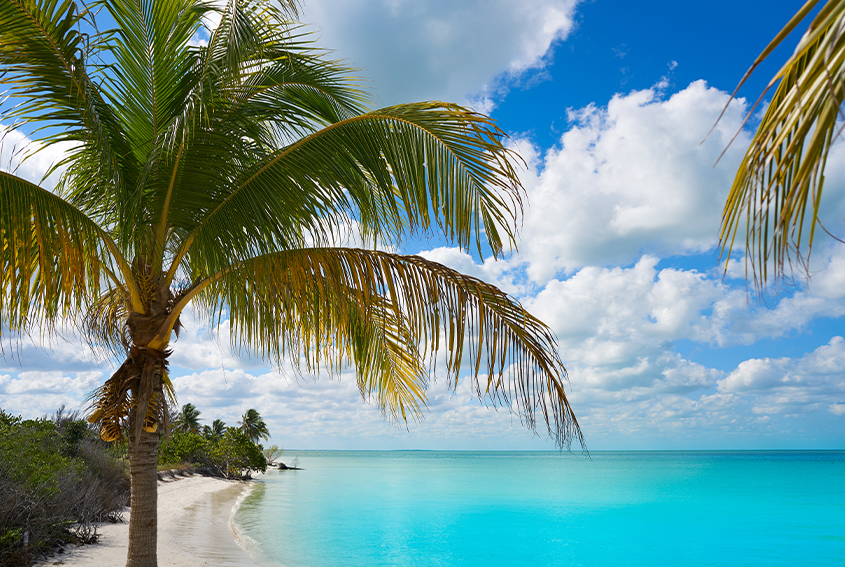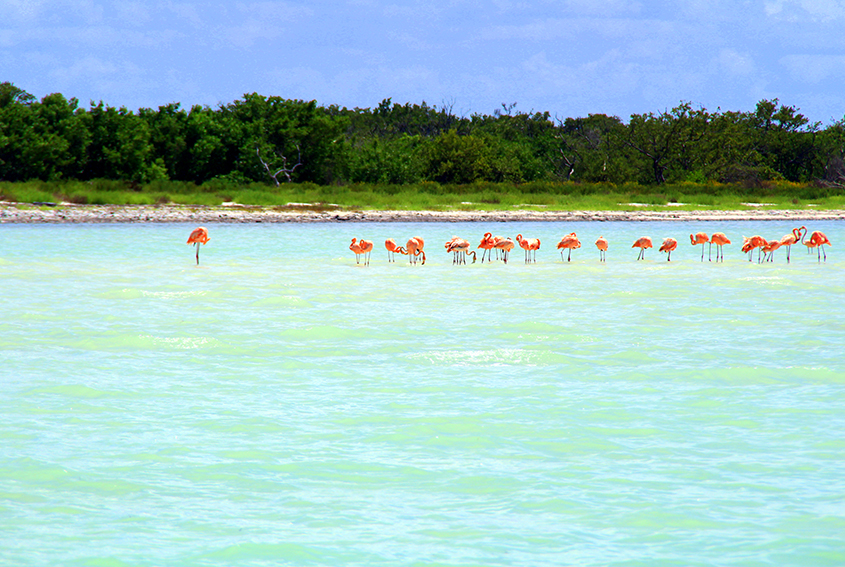Holbox, Gulf island hideaway

As you walk along a swathe of dazzling white sand lined with palm trees, thatched beach bars, hotels and casitas, you might think that you are on the Caribbean coast in the Riviera Maya, yet Holbox, Quintana Roo’s fourth island, is located off the north coast of the Yucatan Peninsula in the Gulf of Mexico. It is a captivating spot, a haven for wildlife watchers, fishermen and visitors who want to discover a different side of Mexico, unhurried and natural. Thomas More Travel has a day trip that will enable you to do just that.
The adventure starts in the Gulf coast port of Chiquila where you board the ferry or a water taxi to cross Yalahau Lagoon that separates Holbox from the mainland. Keep a look out for dolphins swimming alongside the boat, cormorants and osprey diving for fish.
Holbox (which means “black hole” in Maya) is part of the Yum Balam Biosphere Reserve, an area of mangroves, marshes and tropical forest rich in wildlife. Flamingos, herons and egrets feed in the lagoons, crocodiles and manatees are sometimes sighted and jaguars, pumas and ocelots still roam the jungle further inland.
Cenotes and Bird Island
First stop on the Thomas More Travel Holbox day trip is Cenote Yalahau or Ojo de Agua, an open cenote or pool in the mangroves that is also a natural spring with fresh water bubbling up from an underground river. There’s also a wooden observation tower with panoramic views of Holbox, Yalahau Lagoon and the Yum Balam wetlands.
Once you have had your fill of swimming in the cool, crystal-clear waters of the cenote it’s on to Isla de los Pajaros or Bird Island. This sand bar is a feeding ground for flamingos, different species of herons, reddish egrets, white and brown pelicans and cormorants.
The boats tie up on the Holbox waterfront where lunch is served at a restaurant overlooking the beach. With its sandy streets, wooden houses, colorful street art and hand-painted signs depicting whale sharks, sea turtles, manta rays and flamingoes, the rustic fishing village on Holbox has its own brand of Caribbean charm. Life has a slower pace and a stroll along the shell-strewn white beach to watch the fishermen unloading their catch, with pelicans and gulls waiting expectantly for scraps is not to be missed.
After lunch it’s time to board a golf cart to explore the 25-mile-long island. The first 30 minutes are guided and then you have 90 minutes to yourself. Start in the picturesque fishing village itself then drive along the island for breathtaking views of white-sand beaches, the Gulf of Mexico and the wetlands in the distance.
After you have returned the golf cart, walk along the beach where boats rock gently at their moorings and enjoy a drink at one of the thatched bars, the perfect spot to watch the sun set over the Gulf of Mexico in a glorious blaze of pink, gold, orange and red.
Sea turtles nest on the beaches of Holbox during the summer and on moonless nights the breaking waves glow with bioluminescence emitted by microscopic plankton.
It’s easy for visitors staying longer just to soak up the beauty of Holbox and do nothing but sunbathe and swim, escape to a hammock in the shade of a palm tree for an afternoon siesta and enjoy island hospitality and fresh seafood, including lobster pizza, tikinxic and grilled octopus for dinner. Yet, for those who want to explore further there are plenty of options.
Fishermen from Holbox and Chiquila offer bird watching trips in the area, crocodile spotting, fishing, and whale shark watching in the summer. Some offer trips to Cenote Yalahau, the Isla de los Pajaros and Isla de la Pasion where birds also feed and nest and then around the tip of Holbox and along the coast heading east. They come to a spot where they anchor offshore, and you can literally sit in the clear, calm shallows and bask in the sun.
Longer excursions are available to Rio Lagartos Biosphere Reserve and along the coast to Cabo Catoche Peninsula where the waters of the Gulf of Mexico meet those of the Caribbean. From Cabo Catoche it is possible to navigate the lagoons and mangrove forests to reach Boca Iglesia. In this remote spot are the ruins of the first chapel built by Spanish conquistadores in Quintana Roo, one of the earliest churches in the Americas.
If you decide to rent a car and explore at your own pace or arrange a private tour with Thomas More Travel to spend longer on the island, Holbox is a two-hour drive from Cancún (via the toll highway at El Tintal and Kantunilkin) and a 30-minute ferry ride from Chiquila. Take time to stop in the villages on the way.
In San Angel there are traditional medicine and embroidery workshops, and you can go mountain biking in the jungle, kayaking and bird watching in a nearby lagoon.
Solferino has an orchid nursery in the shade of a towering ceiba tree that is reputed to be over 700 years old. The owner raises fragrant orchids native to the Yucatan Peninsula and tells visitors the local legend about the ceiba. It is said to be the home of the dreaded Xtabay, the serpent woman that appears to men in the jungle and seduces them with her beauty so that they lose their way and their minds.
A group of villagers offer eco tours to a jungle camp with a rustic zip line circuit and an observation tower for panoramic views of the jungle. Guides take visitors on a kayak trip to El Corchal, a strange, flooded forest in the middle of a lagoon in the savanna that is a habitat for birds, iguanas, crocodiles and tamanduas or Mexican anteaters in search of their favorite food, termite nests.
Booking your trip
For information about the Holbox day trip and private tours visit the Thomas More Travel tour desk during your stay or email tourdesk@royalresorts.com

